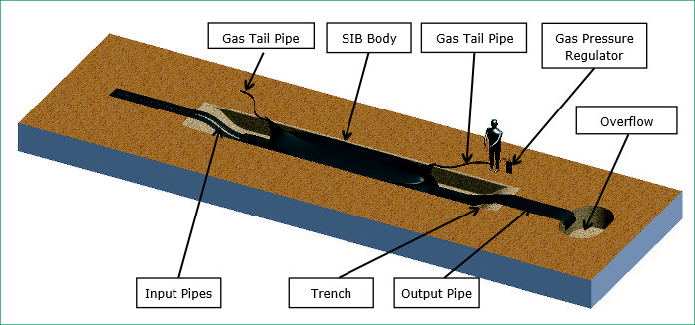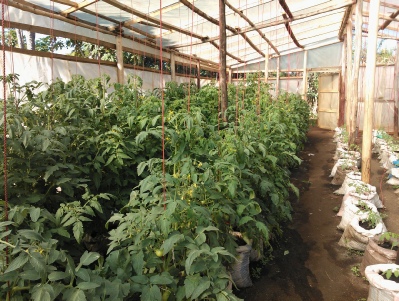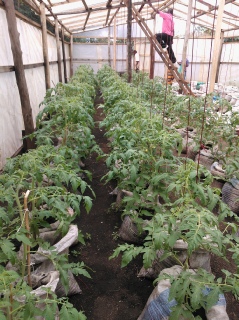



Sustainable OneWorld Technologies C.I.C.
Lynn’s Letters from 2015
Archive
The team of four graduate students from Cambridge University who we told you about in February's Lynn's Letter have just been awarded a bursary by Smart Villages for a pilot study on the use of biogas as a sustainable fuel replacement in situations where people currently used charcoal and kerosene. The pilot studies will be in Dar es Salaam in a peri-urban setting and in Sierra Leone in a rural location and Flexigesters will be used to produce the gas in both places.
The students are drawn from a number of disciplines. Steffen Illig is a 3rd year physics PhD student from Germany. He has been involved with installing a biogas plant in Uganda at a school attached to an orphanage. Luis Outón is in his second year of a PhD in physics, Flora Tasse is from Cameroon and is in her 3rd year at the Computer Laboratory studying for her PhD and Sara Duarte is also a 3rd year PhD student but her subject is neuroscience. Sara is Portuguese.
The four were chosen to be part of a 20 strong group of graduates at a forum held by Smart Villages in January. The forum was held to bring together graduates in Cambridge from different disciplines to help identify practical applications of research including innovations for effective and affordable solutions at the village level, novel ideas which would allow local entrepreneurs to deliver solutions for societal change, and insights into the framework conditions required to bring about change in villages without access to electricity.
The Smart Village Initiative (http://e4sv.org/) works in villages across the globe to bring sustainable energy to those communities that have no access power, mainly in the form of electricity. They look to bring together entrepreneurs, innovators and those who can think out of the box with the policy makers, fund holders and development agencies to help break down barriers to providing rural communities with sustainable energy. They believe that access to sustainable energy is a stepping stone to providing better education and healthcare, improving access to sanitation and clean water and providing employment.
We are really pleased that the Cambridge team have been awarded this bursary and are looking forward to working with them.
Since the beginning of the year we have met a number of groups of people who are interested in our Flexigesters. One group were graduate students from Cambridge University who had attended Forum hosted by Smart Villages (http://e4sv.org) and sponsored by the Malaysian Commonwealth Studies Centre and the Winton Programme for the Physics of Sustainability. The purpose of the Forum was to bring together Cambridge graduates to brainstorm practical applications of research, and innovations for effective and affordable solutions required to bring about change in villages without access to electricity. One graduate, Steffen, had previously met us and he put forward the idea of a Flexigester.
From that starting point he convened a meeting with the rest of his team and Dr Nalin Patel, who is the Programme Manager for the Winton Programme for the Physics of Sustainability (http://www.winton.phy.cam.ac.uk/) based at the Cavendish Laboratory in Cambridge. The programme supports research into applying physics to meet the growing demand on our natural resources including exploring the basic science which can generate new technologies and new industries.
As part of the Winton Programme people are invited to teatime meetings to inform our students of interesting topics and to discuss them. We were privileged that Dr Patel invited us to host the meeting on 12th February. John gave a 15 minutes talk on “Beyond the pit latrine - developing tools for organic waste management in the Global South”. There were about 12 people present, both from inside and outside the university and after the talk there were some lively discussions about producing biogas and biofertiliser from human sewage and the sanitation problem in the Global South.
We hope that this will be the start of an ongoing collaboration with the Winton Programme and Smart Villages.
As well as the talk coming out of that initial meeting, a second member of the Smart Villages team, Luis Outón, has introduced us to the CFO of Mountain Lion Agriculture who work with farmers in Sierra Leone. We hope to bring you news of our meetings with him soon.
18 February 2015
On 24-26th March the 12th Dubai International Humanitarian Aid & Development Conference & Exhibition (DIHAD 2015) is taking place at the Dubai International Convention & Exhibition Centre. The overall aim of DIHAD is to contribute to the further enhancement of technically sound and principled international humanitarian and development assistance. This aim is pursued through three main tracks: the transfer and sharing of knowledge through presentations, debate and dialogue; the showcasing of new trends in operational support and supply services related to the assistance domain; and networking among local, regional and global players. They are expecting 330 companies from 66 countries to be exhibiting with 9,000 people attending the event.
You may well be thinking “so what?” by now.
The exciting part for us is that Butyl Products Ltd are one of those 330 companies exhibiting and they have generously invited SOWTech to be part of their exhibition team to promote the Flexigester products. In fact not only will John be in Dubai on the Butyl exhibition stand, but the Flexigester brand has been awarded a slot by the conference organisers in the "Innovation Area". This means that John will be giving a 30 minute conference talk about the products as well.
We are really grateful to Butyl Products for giving us this opportunity. DIHAD is a major exhibition in the “Aid" field and an ideal place to showcase the Flexigester along with the other equipment that Butyl Products supply to the aid market.
23 March 2015
25 March 2015
Our latest new product was launched yesterday at DIAHD 2015 – The Flexigester SIB. SIB stands for Sewage Isolation Bag and it has been designed for a market that is new to us – that of temporary camps in industries such as oil and gas exploration. Butyl Products Ltd have been active in this area for a number of years and, in talking to their clients, they found that sewage waste can be an issue in these temporary camps.
Often the only way to dispose of sewage is in open pits or lagoons which are odorous and attract flies and vermin. Those in charge of the camps were looking for something that could contain the waste and improve the environment of the camps. Hence the SIB was conceived.
The SIB has been designed to capture and isolated sewage from pour-flush latrines and store it in a controlled environment. Once the sewage is in the SIB there are no smells, nothing to attract flies and vermin and the groundwater is protected. The sewage can then be stored for the duration of the camp (dependent on the SIB size and the population and duration of the camp). The contents can then be treated with for example lime prior to disposal or the contents pumped out and transported for disposed at a suitable facility. The SIB can then be cleaned, rolled up and moved to the next camp.
We have already had some interest in this new product from the oil and gas industry. If you would like to learn more about it have a look at the Flexigester website (http://www.flexigester.com/sib.html).

21 April 2015
We have had a number of enquiries from people wanting to use a Flexigester to capture and treat human sewage so that the output could be put onto land as a fertiliser. The qualitative benefits of biofertiliser are well known but the quantitative facts not so readily available. We have therefore being doing some research into this and have written a Technical Article on “Sewage as a source of plant macro-nutrients”. The conclusions that we reached were that human sewage is a good source of macro-nutrients, that is nitrogen, potassium and phosphorous, with around 70% of the nutrients being found in the urine compared to faeces and that the anaerobic digestion process can improve the capture and the plant-available form of the nutrients. If you would like to read more the Technical Article can be found at http://www.flexigester.com/resources.html.
We have recently had a practical example of the benefits of biofertiliser from the Flexigester installed at the orphanage at Namisu, Malawi. The biofertiliser from the Flexigester was passed through Pasteu tubes to deactivate any pathogens in the liquid before being poured onto a soil donut. The soil donuts, which contained the dirt soil removed from the trench when the Flexigester was installed, captured the nutrients out of the digestate. This nutrient-enriched soil was then put into smaller bags and a tomato plant was planted in each. Some tomato plants were grown in soil straight from the donuts whereas other had additional fertiliser added to the donut soil. The results can be seen in the photographs.
Angus the General Manager of the orphanage said “Those growing totally on donut soil are doing well, those which had additional are growing exceptionally well. So that although there is a fertilizer benefit, the trials equally prove that those without fertilizer will do pretty well too on the soil enriched only with biofertilizer from the Flexigester”.
You may remember at the end of 2014 I told you that Butyl Products Ltd were sponsoring a Flexigester for an Approved School in Freetown, Sierra Leone via the charity Practical Tools Initiative www.practicaltoolsinitiative.org/. The Flexigester arrived safely earlier in the year but due the Ebola crisis restricting movements in Freetown it could not be immediately installed. 'We are pleased to say that these restrictions have been lifted and a volunteer from Practical Tools Initiative was able to visit the school to start the installation off. He has sent us some photographs and an e-mail that said.....
“Just returning back from ….. after overseeing the digging of the trench at Approved School in Freetown and the preparation for the installation of the Flexigester.
By the time I got there, Mamson [the Project Coordinator for Practical Tools Initiative in the Western Area in Sierra Leone] had studied the Flexigester well (even seeking further information about the Malawi project).
The plot where he located the Flexigester is ideal and the team were very enthusiastic about it. The trench is now complete. All that has to be done is to get the plumber to do the connections and get it going.”
The Flexigester will take the sewage from the latrines and also food and vegetable waste. The gas produced will be used in the kitchens and the biofertiliser on the school gardens where they grow their own food crops.
It is really exciting to see the project taking shape and hope to be able to bring you more news soon.
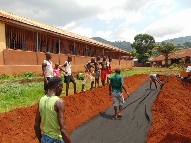
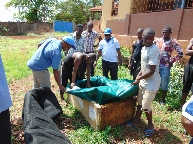
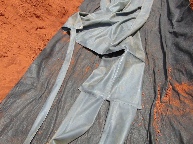
14 July 2015
Another Flexigester is on its way to Africa. This one is slightly different to the others that we have provided so far. It's bigger and it is for a different application.
The Flexigester is a V40, meaning that it can hold 40m3 of waste at any one time. This is much bigger than the V10s that have been deployed else where. It is going to be part of a project run by Cambridge Development Initiative (CDI; http://cdi.soc.srcf.net/). CDI is a student-led development consultancy who are working with communities in Dar es Salaam, Tanzania. One of their projects is a simplified sewage system in one of the slum areas in Dar es Salaam, Vingunguti, an informal settlement of 80,000 people. This area contains one of the city's huge waste treatment ponds. The existing sewage system discharges into this pond but the sewage is not treated and the people of Vingunguti are not connected to that sewage system. So last summer the students helped to install a simple sewage system along with new pour-flush toilets to about 20 households in Vingunguti. This summer they are looking to not only expand the system but also the treat the waste before it goes into the pond using a Flexigester.
The sewage will be diverted through the Flexigester where it will be treated and produce biogas. This biogas will then decanted into transportable gas bags and sold to individual households for use as a cooking fuel. The bags can then be returned and refilled just as we would with calor gas bottles. At present most cooking is done on charcoal or kerosene and the average family spends about $2 per day on charcoal. So selling the gas will not only reduce their costs and provide a cleaner fuel but will enable a local entrepreneur to set up a business and make a living selling the gas.
This is a really exciting project and we look forward to hearing more about it when it is installed.
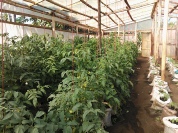
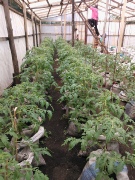
John has recently returned from a two week trip to Africa. The purpose of his visit was to visit some of our current projects and to meet with potential new clients and discuss their project requirements.
He started in Uganda at Kyenjojo near Fort Portal. At the end of last year we sent a Flexigester V10 to Paul Kyalimpa through the charity Afrinspire. After months at sea and overland travel Paul finally took delivery of it. When John arrived Paul had prepared the trench and was about to install the Flexigester so he was able to give Paul technical advice first hand. One of the first things that became clear was the worry of security for the Flexigester. Paul therefore had built brick and concrete walls to protect the digester and its inputs and outputs. Paul runs a demonstration farm for the Sustainable Agriculture Farming Initiative. The Flexigester will initially be fed on cattle manure with the biogas being used in the kitchen and the digestate as fertiliser on the land. Future Lynn's Letters will keep you updated on the progress.
From Uganda John flew to Malawi where he met up with Angus at the orphanage in Namisu. The new Flexigester has been installed there and the commissioning has begun. Whilst in Malawi John also met with a number of people including personnel from WASTE, a Dutch NGO who were involved with the original Namisu project, to discuss the Flexigester and other potential projects in Malawi.
Being able to visit these installations has given John first hand insights into what works well with the Flexigester and the problems that clients are facing. He has come home with lots of ideas of how we can improve and make simpler the installation and operation of the Flexigester as well as lots of photographs.
For more information and photos about these and other projects keep an eye on our project pages as they get populated and updated.
While others have been taking a break for their summer holidays we have been busy here at SOWTech with an exciting project – working with students from Cambridge University's Cambridge Development Initiative (CDI; http://cdi.soc.srcf.net) on a sustainable simplified sewerage system in Vingunguti, an informal settlement area of Dar es Salaam in Tanzania. What is really exciting is that this is, possibly, the first sustainable simplified sewage system. What makes it unique is that the system not only collects sewage from areas that can not normally be part of a sewage system but by connecting it to a Flexigester the sewage can be treated before discharging it AND the biogas produced can be sold back to the local community as a fuel for cooking to replace charcoal. The sale of the biogas will generate an income which makes the provision of the whole system a “money earner”.
To try and explain the huge significance of this let me give you some background information. One of the big problems in the Global South is how to deal with sanitation in urban and peri-urban slums and informal settlements. These areas are characterised by densely packed small houses which can be occupied by a large extended family that have erected where there is space and not laid out in a regular pattern. Toilets are usually at best a pit latrine which is often shared by a number of households. These pit latrines are difficult and expensive to empty so people don't bother. They then overflow into the street, especially when it rains as the latrines often don't have roofs. I'll leave the rest to your imagination……...
One solution to this problem is to install “simplified sewage systems”. These systems, found mainly in South America, use smaller pipes than conventional sewerage pipes and they are buried to a shallower depth in the ground. In 2014 the Cambridge University students with the help from students from Ardhi University in Dar es Salaam installed the first simplified sewerage system in Tanzania. They provided pour-flush toilets to 20 households and connected them to pipework that took the sewage directly from the latrines to the city's waste treatment ponds. The irony is that these people live alongside the huge open waste treatment ponds but until now only the waste from the most privileged 13% of Dar es Salaam population is piped into the ponds.
But the “simplified sewage system” alone is not realising the full potential. The Flexigester provides the missing piece of the jigsaw. By connecting the sewerage system to a Flexigester the waste can be treated before it is discharged into the waste treatment ponds and biogas generated.
Over the past few weeks the Cambridge students have been installing their second simplified sewerage system network into Vingunguti only this year it is connected to a Flexigester V40. The production of the biogas has been seen as a business opportunity which will make the whole system more sustainable. A local entrepreneur, Juma, has been identified by the students and the local community as the person to trial the biogas venture. The biogas will be collected in a large storage bag and then pumped into our smaller “Transportable Gas Bags” that can be easily carried by one person allowing it to be sold to individual households as a cooking fuel to replacing charcoal. The concept is akin to a calor gas bottle – you buy the refill. Juma is going to start small with 6 gas bags to be able to prove the concept but the ambition is to expand and so make a viable business out of selling biogas and making a valuable contribution to the reduction of charcoal use.
The local water authority and company in Dar es Salaam, DAWASA and DAWASCO are enthusiastic supporters of the project and have provided the land that the Flexigester is built on. The students from Ardhi University will be running of the system once to Cambridge students have returned home.
This is a really exciting opportunity for us. We have linked up with partners with whom we have a synergy, and we have a formula could be replicated in other informal settlements throughout Tanzania and beyond.
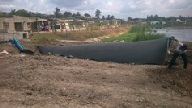
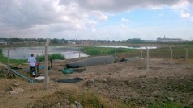
28 August 2015
12 October 2015
I suppose the first thing I have to tell you is what ISNTD is before you all divert to look it up on Google! ISNTD is the International Society for Neglected Tropical Diseases. Not the first place you would think of in connection with the Flexigester. However, every year they have a Water conference and this year the by-line for it was Water, Sanitation & Urbanisation: Frontiers in Global Public Health.
Butyl Products Ltd had booked to attend and they asked John to do a ten minute presentation on the Flexigester in the Technology Section. This was a new type of audience who were primarily interested in the health benefits. The talk was entitled “A New Tool for Treating Waste” and was based around the three B's
Bag it
Break it down
Benefit from it
People were interested in the Flexigester and John made a lot of new and interesting contacts. What did become apparent was that people were interested in the impact of projects – how many people have benefited, what percent of users have been saved from catching which diseases, etc? These are all interesting questions and going forward we are looking to measure these and other impacts including such things as how much nitrogen we have recycled back to land and how much charcoal we have replaced.
30 October 2015
These days the news seems to be full of the plight of people in disaster situation, be it natural as in the Nepal earthquake or man-made as in the Syrian crisis. On our TVs we see pictures of the international aid agencies flying in food and clean water to help alleviate the suffering but one of the more difficult areas to provide aid in is that of sanitation and toilets. Although you can survive without a toilet, adequate sanitation plays an important role in disease prevention as well as preserving human dignity.
Here at SOWTech in collaboration with Butyl Products Ltd we took a step towards helping to provide sanitation in aid situations when Butyl Products secured an order from the French aid agency Action Contre la Faim (ACF) for two Flexigester V10s.
The Flexigesters they have bought are not for immediate use but will go into the ACF warehouse along with the other aid items that Butyl Products supply to them. The goods in these warehouses are there so that when the next emergency comes along ACF are immediately ready to respond and, if the circumstances are right, a Flexigester could also be on its way to help deal with the human sanitation waste.
This is our first order from the aid market but it is a market we were aiming to break into so we hope that this is the first of many.
10 November 2015
One of the latest orders obtained by Butyl Products for a Flexigester has caused a lot arguing at both Butyl Products and at SOWTech. Everyone is wanting to go and install it for the client despite one of the remits of the Flexigester being that it is simple enough for the client to install it themselves. The reason for this sudden desire to help with the installation? ….. it is going to the Maldives!
This Flexigester has been sold into a new market area for Flexigester but an existing one for Butyl Products – that of temporary camps. Many industries including oil and gas and the military have the need to set up temporary camps. These camps may be occupied for a few weeks to a number of years but they all need the infrastructure of a permanent base including sleeping accommodation, kitchen and of course toilet facilities. Often the waste from the toilets is just piped to a large lagoon where it sits attracting flies and giving off unpleasant odours. When the camps close down these lagoons are often just left behind. The people installing and running these camps are becoming more aware of the unwanted legacy that they are leaving behind for the local people and the local environment and are looking for ways to improve the situation both whilst they are using the camp and after they have left.
But back to the Maldives (I wish - they wouldn't let me go either!). The camp that is going to be erected there is slightly different. It will be a more permanent camp but the occupants are transitory. The camp is going to be used as a shore base for the employees of a company that provide safety, supply and support services to ships at sea. They wanted to do something more responsible with their waste water than just sending it out raw into the ocean. Hence they are going to install a Flexigester to treat it first.
We hope that this will be the first of many Flexigesters being sold into this type of industry.

18 December 2015
We have just received news that Paul Kyalimpa (or rather his wife Christine) is cooking on gas! Paul is the Director of the Hope Community Gracious Foundation, in Uganda. We sent him a Flexigester earlier in the year via the Cambridge charity, Afrinspire and John helped to install it when he visited in July. Paul has just sent us a report with photos of the Flexigester now in use. A copy of the report can be downloaded here.
Paul has adapted the Flexigester for his own needs and circumstances. He is feeding the Flexigester with animal dung which is too solid to flow down the inlet pipe on its own so he has built a mixing tank to mix the dung with water. This increases the fluidity of the material so that it easily slides into the Flexigester. He has also built walls and a roof on it. Theft can be a big problem where he lives and the roof and walls protect the structure from humans as well as the local rats!
So why the title “Reducing the silent killer”.
In Paul's report he states:
“Smoke-related diseases kill more people than malaria, unsafe water and sanitation do. However, smoke, which is being described as a ‘silent killer’ in kitchens, is largely ignored by medical establishments.
Biogas usage is helping to alleviate smoke pollution and is eliminating health hazards and implications to us now which were due to use of fire wood use for cooking”.
The replacing of wood and charcoal by biogas not only reduces the smoke pollution in the kitchens but also can reduce the rate of deforestation in these countries. In a conference paper by Richard Magala of Makerere University he states that Uganda's lost over 1.5 million ha of forest between 1990 and 2005 and that the rate of deforestation is increasing year on year. It is predicted that at the current rate Uganda’s forests will not exist in 40 years time. Anything that we can do to help reduce that alarming statistic must be good news.
| Lynn's Letters |
| Lynn's Letter archive 2019 |
| Lynn's Letter archive 2018 |
| Lynn's Letter archive 2017 |
| Lynn's Letter archive 2016 |
| Lynn's Letter archive 2015 |
| Lynns Letter archive 2014 |
| Lynns Letter archive 2013 |
| Emergency sanitation |
| Rainwater harvesting |
| Renewable energy |
| Fertiliser production |
| Solar power cooking |
| Flexigester |
| Pasteu Panel |
| Raparound gutters |
| Interseasonal water storage |
| Gas bags |
| Compost System |
| eCook stove |
| Sanitation |
| Rainwater harvesting |
| eCookstove |
| Agriculture |
| Anaerobic digestion |
| Rainwater harvesting |
| Solar cooking |
| Soil improvers |
| About SOWTech |
| Links to websites |
| What's in a name |
| SOWTech team |
| Our partners |
| Our History |
| CICs |
